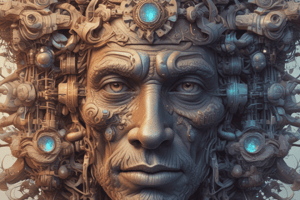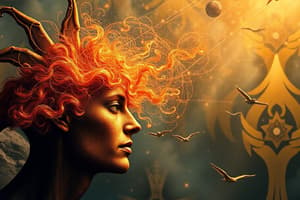Podcast
Questions and Answers
What is archetypal theory?
What is archetypal theory?
Archetypal theory is a literary and cultural theory that focuses on identifying and analyzing recurring symbolic patterns, images, and themes found across different myths, stories, and cultural narratives.
What is the collective unconscious in archetypal theory?
What is the collective unconscious in archetypal theory?
The collective unconscious refers to the part of the unconscious mind that is shared among all human beings and contains universal symbols, motifs, and archetypes. Archetypal theory often explores the collective unconscious and the deep and often subconscious meanings shared among various cultures and historical periods.
What are archetypes in archetypal theory?
What are archetypes in archetypal theory?
Archetypes are foundational elements of human culture and storytelling that transcend specific cultural contexts. They can take the form of characters, symbols, plots, motifs, or themes that recur across different myths, folktales, and literary works.
What is the main focus of archetypal theory?
What is the main focus of archetypal theory?
What are the key concepts and characteristics of archetypal theory?
What are the key concepts and characteristics of archetypal theory?
Flashcards are hidden until you start studying
Study Notes
Archetypal Theory
- Archetypal theory is a concept developed by Carl Jung, a Swiss psychiatrist, which proposes that certain universal symbols, called archetypes, are part of a collective unconscious, shared among all humans.
Collective Unconscious
- The collective unconscious is a shared psychological reservoir that contains universal symbols, called archetypes, which are common to all humans across cultures and time.
- It is a layer of the unconscious that is shared among all humans, distinct from the personal unconscious.
Archetypes
- Archetypes are universal symbols, images, and themes that appear across different cultures and time, representing common human experiences and emotions.
- Examples of archetypes include the Mother, Father, Child, Trickster, and Hero.
- Archetypes are thought to be part of the collective unconscious, inherited from our ancestors.
Main Focus
- The main focus of archetypal theory is to explore the universal patterns and images that appear across cultures and time, and to understand their role in shaping human behavior and thought.
Key Concepts and Characteristics
- Universal symbols and images: Archetypes are universal symbols and images that appear across cultures and time.
- Collective unconscious: The collective unconscious is a shared psychological reservoir that contains archetypes.
- Inherited from ancestors: Archetypes are thought to be inherited from our ancestors.
- Shared across cultures: Archetypes are shared across cultures and time.
- Represent common human experiences: Archetypes represent common human experiences and emotions.
Studying That Suits You
Use AI to generate personalized quizzes and flashcards to suit your learning preferences.




